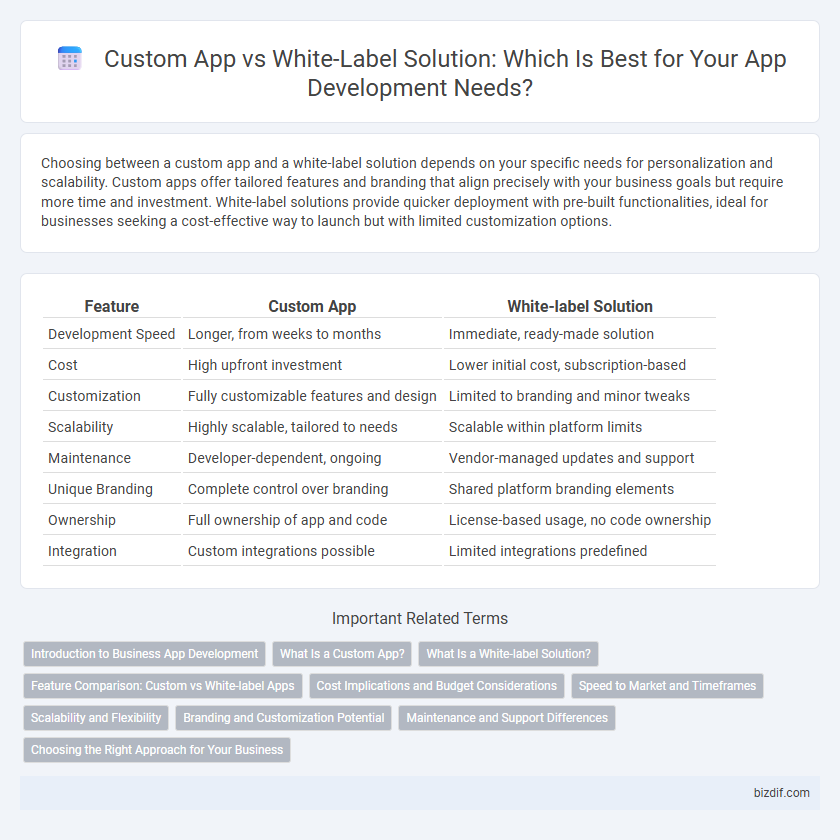Choosing between a custom app and a white-label solution depends on your specific needs for personalization and scalability. Custom apps offer tailored features and branding that align precisely with your business goals but require more time and investment. White-label solutions provide quicker deployment with pre-built functionalities, ideal for businesses seeking a cost-effective way to launch but with limited customization options.
Table of Comparison
| Feature | Custom App | White-label Solution |
|---|---|---|
| Development Speed | Longer, from weeks to months | Immediate, ready-made solution |
| Cost | High upfront investment | Lower initial cost, subscription-based |
| Customization | Fully customizable features and design | Limited to branding and minor tweaks |
| Scalability | Highly scalable, tailored to needs | Scalable within platform limits |
| Maintenance | Developer-dependent, ongoing | Vendor-managed updates and support |
| Unique Branding | Complete control over branding | Shared platform branding elements |
| Ownership | Full ownership of app and code | License-based usage, no code ownership |
| Integration | Custom integrations possible | Limited integrations predefined |
Introduction to Business App Development
Custom app development delivers tailored functionalities and unique user experiences designed specifically to meet a business's operational needs, enhancing efficiency and competitive advantage. White-label solutions offer pre-built, rebrandable apps that allow companies to quickly launch products with lower development costs but limited customization options. Choosing between custom development and white-label solutions depends on budget, timeline, scalability requirements, and the need for distinctive features.
What Is a Custom App?
A custom app is a software application specifically designed and developed to meet the unique requirements of a particular business or user group, ensuring tailored functionality and user experience. Unlike white-label solutions, custom apps offer complete control over features, branding, and integration with existing systems, providing a competitive advantage through personalization. Custom app development often involves iterative collaboration between developers and stakeholders to create scalable, secure, and efficient software aligned with precise business goals.
What Is a White-label Solution?
A white-label solution is a pre-built software product developed by one company that other businesses can rebrand and customize as their own app. This approach allows companies to quickly launch an app with standardized features and reduced development costs, avoiding the complexities of building a custom application from scratch. White-label apps are commonly used in industries like fintech, healthcare, and e-commerce to accelerate time-to-market while maintaining brand identity.
Feature Comparison: Custom vs White-label Apps
Custom app development offers tailored features specifically designed to meet unique business needs, providing greater flexibility and scalability than white-label solutions. White-label apps come with pre-built functionalities that expedite deployment but lack extensive customization options, often resulting in limited differentiation. Businesses seeking specialized workflows and brand-specific innovations typically benefit more from custom apps, while white-label solutions serve well for faster, cost-effective market entry with standard features.
Cost Implications and Budget Considerations
Custom app development typically involves higher upfront costs due to tailored design, unique features, and dedicated development hours, resulting in greater initial investment but better scalability. White-label solutions offer lower initial expenses by providing pre-built frameworks that can be quickly rebranded, making them ideal for limited budgets and faster deployment. Long-term maintenance and update costs tend to be higher for white-label apps because of restricted customization, whereas custom apps may have predictable expenses aligned with specific business growth needs.
Speed to Market and Timeframes
Custom app development offers tailored functionality but typically requires longer timeframes due to design, coding, and testing phases, leading to slower speed to market. White-label solutions enable rapid deployment since the core app is pre-built and only requires branding and minor customization, significantly reducing time to market. Businesses prioritizing quick launch and immediate availability often prefer white-label apps, while those needing unique features might opt for custom development despite longer delivery times.
Scalability and Flexibility
Custom app development offers superior scalability by allowing tailored architecture adjustments to meet evolving business needs, unlike white-label solutions which often come with fixed features and limited customization options. Flexibility in custom apps enables seamless integration with existing systems and unique workflows, ensuring the application grows with the company's specific requirements. White-label solutions, designed for quick deployment, may restrict long-term innovation due to standardized templates and limited control over updates.
Branding and Customization Potential
Custom app development offers unparalleled branding opportunities by allowing businesses to design unique user interfaces, integrate specific features, and align the app closely with their brand identity. White-label solutions provide quicker deployment but limit customization, often resulting in generic branding and feature sets shared across multiple users. Prioritizing custom apps enhances differentiation, user engagement, and long-term brand loyalty through tailored functionality and visual coherence.
Maintenance and Support Differences
Custom apps offer tailored maintenance and dedicated support directly from development teams, ensuring rapid issue resolution and personalized updates aligned with specific business goals. White-label solutions rely on third-party providers for support, often resulting in standardized maintenance schedules and limited customization options, which may delay response times. Choosing custom development guarantees greater control over app lifecycle management, while white-label solutions prioritize cost-efficiency with predefined support frameworks.
Choosing the Right Approach for Your Business
Custom app development offers tailored solutions that align precisely with unique business needs, ensuring complete control over features and user experience. White-label solutions provide faster deployment and cost-effectiveness by leveraging pre-built apps that can be branded and slightly modified. Selecting the right approach depends on factors like budget, time constraints, scalability requirements, and the level of customization needed to support long-term business goals.
Custom App vs White-label Solution Infographic

 bizdif.com
bizdif.com